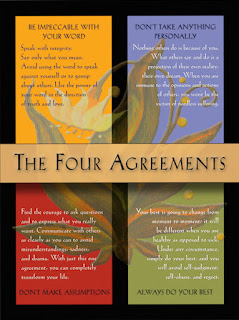
Do you find yourself worrying about things
that you did in the past?
Do you worry about how your life is going
to be in the future?
Does it distract you from what you are
doing now, today?
In the busy lives we’ve created for
ourselves it has become an art to remain present and live in the moment. To
truly greet each day and only think about what is happening on that day, as well
as being open to everyone and everything around us.
We spend an inordinate amount of time
worrying about the future and wallowing in the past – or even chastising
ourselves about the past and fantasising about the future! And when we do this,
it can put us in an overwhelmed or anxious state, making it harder to bring
ourselves back to the present moment.
By being distracted by either the past or
the future, we rob ourselves of time in the here and now. We wish our lives
away quite literally by thinking over the past and wishing we could change it, or
what we want from our imagined future. And when we do this, we miss what is
right in front of us: the people, the place, and the shared experience.
“The present moment is the only moment available to us
and it is the door to all other moment.” - Thich Nhat Hanh
For me personally, I realised that whenever
I found myself in a situation I was not enjoying, or wasn’t what I hoped for or
expected, I would drift off, disassociating myself from the present life and
living in a fantasy one inside my head. I would disconnect from the present
moment entirely.
This is a form of escapism. When I was
young it enabled me to survive a painful childhood, but once grown up I continued
this pattern of behaviour resulting in me feeling like I was standing on the
outside of my life, desperately wanting to be a part of it, but believing that I
didn’t belong, which only perpetuated the cycle of disconnection.
I didn’t know how to be present, how to
step into the life around me and find it satisfying and rewarding. But over the
course of several years in therapy I started to work it out; I started to
understand how I could change my way of thinking and start engaging in my own
life.
“The ability to be in the present moment is a major
component of mental wellness.” – Abraham Maslow
These are the things I started doing:
1) Reducing Expectations
I talked in a previous post about how reducing expectations can enable us to enjoy events, and social interactions
better. It also applies to the present moment. By not expecting or wanting a
different outcome, and not fearing a repetition of the past, we can experience
the here and now as it is, without any preconceived ideas, embracing the
moments as they unfold.
2) Feeling Appreciation
I started a habit of appreciation. Some
call this ‘living in gratitude’ and connect it to following religious faith,
but it has no religious connotations for me, it is simply seeing the things I
have around me, right there in that moment, on that day, and enjoying them and
recognising how much I have in my life to be happy about.
This is the act of being present with
people. It requires making eye contact, and taking the time to actually hear
what someone else is saying. Registering it both physically and verbally, and
engaging in a conversation, without being distracted either by other things, or
other thoughts. Giving yourself over fully in that moment to the interaction
you are having with another. Besides my own post about it this article on Changing Minds also explains how to go
about it in more detail.
I recognised I had a choice, both about how
I chose to look at things, and in what I chose to do about them – even if that
meant only changing my reaction rather than a physical action. I decided I was
not a victim of my past, I was here now, and I could take steps to achieve the
things I wanted, no matter how small, today. I could focus everyday on what I
could do in that moment to bring about my future desires.
All of these things help me remain present.
I still struggle with it some days, when I become overwhelmed by all the things
I have to do to take care of my family, and all the things I want to achieve
for myself. But I remind myself I don’t have to do it all today. I bring myself
back to the day by noticing something as small as a flower in the garden, or a
bird in a tree, or a cloud in the sky, and taking the time to see it, smell it,
hear it, and feel that day, be in that moment, and not anywhere else in my
mind.
“In the present, when we
allow ourselves to fully live there, we are restored, made wiser, made deeper
and happier.”- Marianne Williamson





